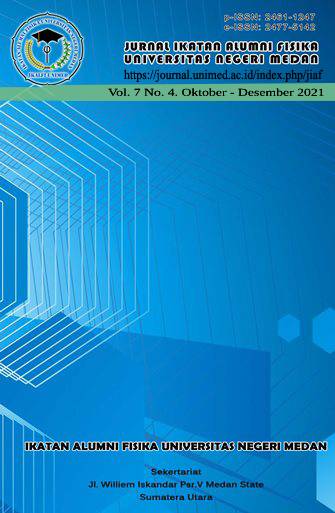Strengthening the Understanding of Physics Concepts through Virtual Laboratories to Answer the Challenges of the 21st Century
DOI:
https://doi.org/10.24114/jiaf.v7i4.24782Keywords:
Fisika, Pendidikan Fisika, Virtual Laboratorium, LaboratoriumAbstract
Covid-19 has had a significant impact on every aspect of life today, from the economy, education, culture, social and others. The purpose of writing this paper discusses the nature of laboratory activities; values and competencies in laboratory activities; virtual laboratory development; the role of virtual laboratory in 21st century learning; opportunities, challenges, and impacts of virtual laboratory activities; various results of virtual laboratory research in 21st century learning; the impact and implication of virtual laboratory in learning. The descriptive qualitative approach is the method used in the preparation of this paper. In the realm of education, if we look at it from the learning process, it is known as e-learning. Learning is carried out online both synchronously and asynchronously. Laboratory learning cannot be separated from the impact caused by covid-19, virtual laboratories are currently an effective and efficient learning method in carrying out laboratory activities, and this is intended to prepare students to face the era of society 5.0 in the pandemic era.Downloads
Published
2023-05-14
Issue
Section
Articles
License
Copyright (c) 2023 JURNAL IKATAN ALUMNI FISIKA UNIVERSITAS NEGERI MEDAN

This work is licensed under a Creative Commons Attribution 4.0 International License.
Authors who publish with this journal agree to the following terms:- Authors retain copyright and grant the journal right of first publication with the work simultaneously licensed under a Creative Commons Attribution License that allows others to share the work with an acknowledgement of the work's authorship and initial publication in this journal.
- Authors are able to enter into separate, additional contractual arrangements for the non-exclusive distribution of the journal's published version of the work (e.g., post it to an institutional repository or publish it in a book), with an acknowledgement of its initial publication in this journal.
- Authors are permitted and encouraged to post their work online (e.g., in institutional repositories or on their website) prior to and during the submission process, as it can lead to productive exchanges, as well as earlier and greater citation of published work (See The Effect of Open Access).

